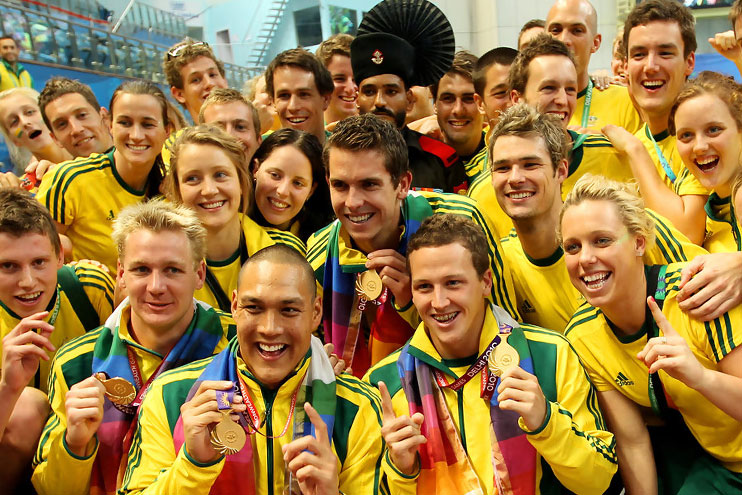
October 3rd marks the 10-year anniversary of the Delhi 2010 Commonwealth Games, a landmark moment of not only the Commonwealth Sport movement but also a significant period in Australia’s history at the Games.
Despite the many challenges, Australian athletes rose above the distractions to dominate the Delhi 2010 Commonwealth Games.
In a team performance once again led by a young group of Australia’s all-conquering women, the team topped the medal tally with 178 medals, including 74 gold, 55 silver and 49 bronze medals, well ahead of host nation India who collected 38 golds.
The Games were the first time that the multi-sport event was held in India and the second time the Games were held in Asia after Kuala Lumpur, Malaysia hosted in 1998. Both important milestones in the continuing story of the Commonwealth Games.
Over 6,500 athletes and team officials from the then 71 Commonwealth Games Associations descended on the Indian capital to participate in 17 sports, including four para sports, ready to compete in 272 events.
Australia’s 366-strong team was the largest team Australia had ever sent to an away Games up until that time, surpassing the 352 team members sent to the Manchester 2002 Commonwealth Games.
Preparation for the Games had received widespread international media attention, often with criticism of the Games organisers. Given the magnitude of infrastructure construction needed to host India’s first multi-sport event the criticism was often directed towards the slow pace of work on the facilities which were going to showcase some of the world’s best athletes. However, as the sporting competition started, the athletes and the spectators enjoyed 12 days of magnificent competition.
Held from the 3rd – 14th October 2010, the XIX Commonwealth Games proved to be a watershed moment in the Commonwealth Sport movement and would be a Games like no other, beginning with a Bollywood themed opening ceremony at the newly renovated Jawaharlal Nehru Stadium in front of some 60,000 fans.
The Australian team was captained for the fourth time by a female athlete, but for the first time by an Australian netballer when Netball Australia legend Sharelle McMahon led the athletes out as opening ceremony flagbearer.
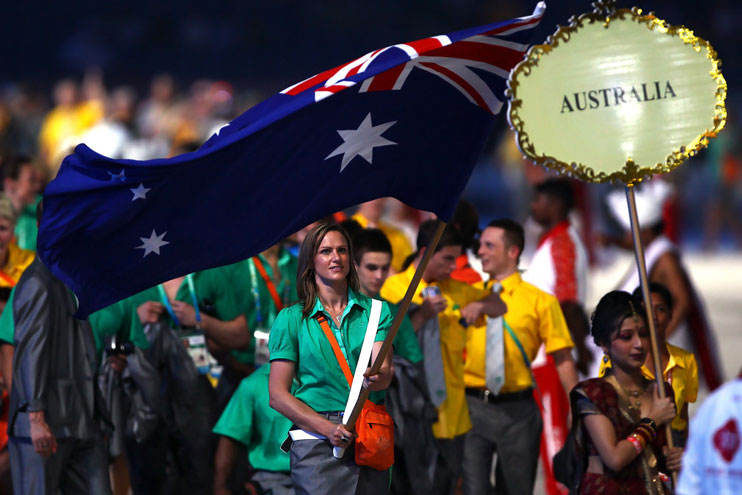
Sharelle McMahon leading the team out at the Opening Ceremony. (CGA Archive)
McMahon was heading into her fourth Games, after debuting at the Kuala Lumpur games in 1998 and where she helped Australia to the gold medal as a 21-year-old and again at the Games in Manchester in 2002.
But the two-time gold medallist was leading the Australian Diamonds in an attempt at revenge after falling five goals short of the New Zealand Silver Ferns in the 2006 Games netball gold medal match, robbing McMahon of a fairy tale finish of winning her third gold medal in front of home fans in Melbourne.
“It’s a huge honour…there’s some fantastic athletes here and to lead them out and be given the honour to carry the flag is fantastic,” McMahon said on being announced as flagbearer. “There’s been some great athletes to carry the flag. It’s a great honour to follow in their footsteps.”
After the retirement of a number of significant names following the Beijing 2008 Olympics such as five-time Commonwealth Games gold medallist Libby Trickett, other athletes opting not to compete in Delhi such as reigning world discus champion Dani Samuels, and some recovering from injury such as swimmer Stephanie Rice, the Games in India provided an opportunity for the next crop of young athletes to take an important step in their sporting journeys.
Australian team chef de mission Steve Moneghetti, leading his first team, was excited about the potential the young team had as they prepared to take on the best in the Commonwealth.
“We’ve got an outstanding history at the Commonwealth Games and we have a pride in our performance,” Moneghetti said ahead of the opening ceremony.
“And this young group of athletes, might I say, they are more eager than a group of athletes I’ve been away with in getting on with the competition because they want to show they are world class athletes.”
Over the course of the next 12 days, the young squad proved the Athletics Australia legend right, as the team members went on to dominate the competition, with 74 golds, some 36 gold medals ahead of second place India’s 38, and 177 total medals, some 35 more medal than the old rival England’s total of 142.
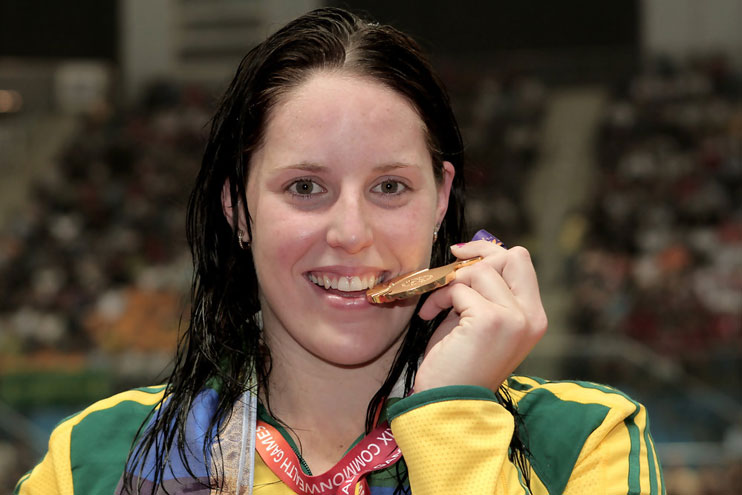
Alicia Coutts winning one of her five gold medals. (CGA Archive)
Coutts dominates the pool
One of the stars of the Games was swimming sensation Alicia Coutts.
After making the Olympic team for Beijing, Coutts dominated the meet in Delhi finishing with five gold medals, including the women’s 100m freestyle and 100m butterfly crowns, becoming the first female athlete to win the two events in Commonwealth Games history. The experience in India proved crucial in Coutts’ development as the Queenslander would go on to win five Olympic medals at the London 2012 Olympics.
Another swimmer who burst off the blocks in Delhi was Emily Seebohm.
After capturing a gold medal in Beijing, Seebohm kickstarted her incredible Commonwealth Games career by capturing eight medals at her debut Games in Delhi, including three gold medals. Seebohm would then use the experience to go on to win three medals in London, the most of any Australian athlete.
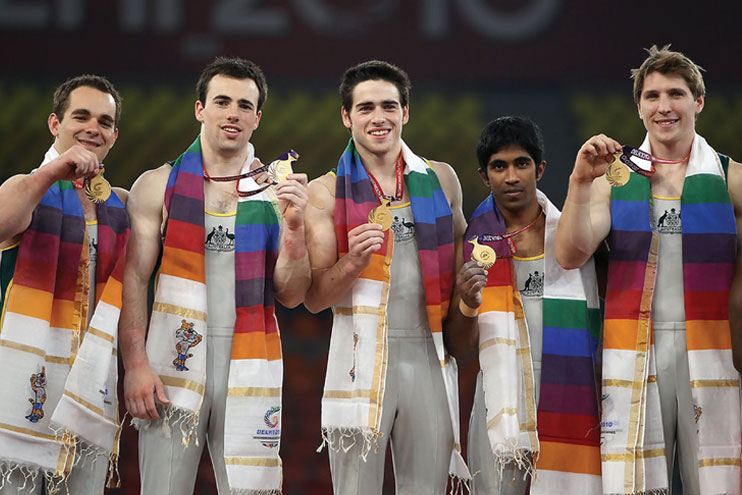
Men’s gymnastics team won the team gold medal. (CGA Archive)
Gymnasts produce best ever Games result
The Games also saw Aussie gymnasts re-establish their dominance against Canada on the mats at the Indira Gandhi Arena. The two powerhouses of Commonwealth gymnastics had finished first and second at every Games from 1990 heading into Delhi, with Canada taking the title over the home nation in Melbourne in 2006. But the Australians regain the title with twelve gold medals led by the outstanding performances of Lauren Mitchell, Naazmi Johnston and the men’s team who took the team gold.
Mitchell was brilliant at the Games, finishing with five medals, four golds and a silver, from the artistic gymnastics events, winning the uneven bars, the balance beam and the individual all-around before helping the Australian team to the gold.
Meanwhile Johnston starred in the rhythmic competitions, winning five medals, including golds in the ball and individual all-around events and helping Australia to the team gold medal.
The men’s team of Josh Jefferis, Sam Offord, Thomas Pichler, Prashanth Sellathurai and Luke Wiwatowski also did their share by winning four of the events including the team competition.
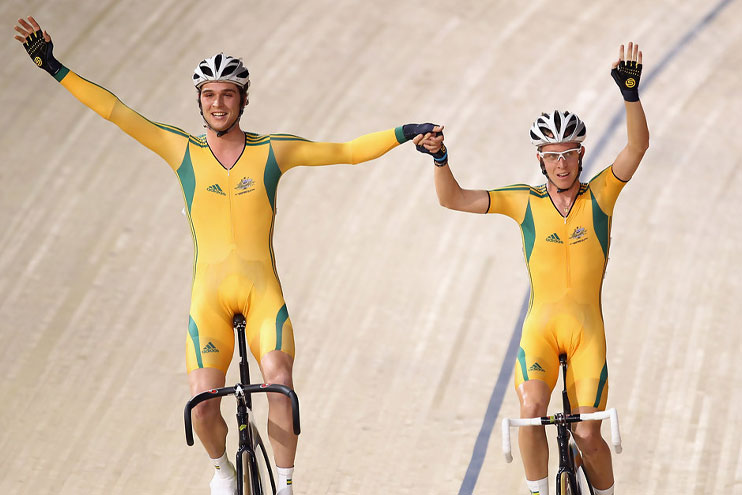
Cameron Meyer (R) and Michael Freiberg of Australia celebrate their gold and silver places. (CGA Archives)
Cyclists pedal to gold on track and road
Australian cyclists dominated the boards of the velodrome and the Delhi streets finishing with 21 total medals, including 14 golds. Inside the velodrome, Cameron Meyer starred with three gold medals, equalled by Cycling Australia legend Anna Meares who added three golds to her career total. While on the Delhi streets, Allan Davis and Rochelle Gilmore won the men’s and women’s road races.
Athletics aces shined brightly
Track and field proved to be another happy hunting ground for the Aussies, finishing the meet with 20 total medals, including 11 gold medals, enough to tie Kenya for the most at the Games.
Olympic and world pole vault champion Steve Hooker defended his Melbourne win to add a second Commonwealth Games gold medal to his career haul, while Alana Boyd captured the women’s title, continuing on the family tradition of winning gold, after her mother Denise Boyd (Robertson) won gold on the track at the Christchurch 1974 and Edmonton 1978 Games, and father Ray Boyd won the pole vault at the Brisbane 1982 Games. Australia had a good games on the field, javelin thrower Jarrod Bannister claimed gold and Louise Ellery won the second of Australia’s three gold medals by female athletes when she won the women’s shot put F32-34/52/53 event.
However, it should have been four gold medals, but the athletics meet had its own controversy involving Australia’s modern-day golden girl of the track Sally Pearson.
The Olympic silver medallist in the 100m hurdles, Pearson added the 100m sprint to her schedule for the Games. Making the final, Pearson and the rest of her competitors lined up in front of a raucous crowd, in fact the crowd was too loud, putting off the competitors and causing a false start for the entire field. A now even more nervous field of finalists took to the blocks a second time, but English sprinter Laura Turner moved in what appeared to be in unison with Pearson.
Disputing her disqualification, Turner ran the third race on protest of the decision, and once finally away, Pearson charged down the straight to record a short-lived win. A gold medal which would be short-lived after protests and counter-protests from England and Australia eventually resulted in the decision to disqualify Sally for also false-starting. A distraught Pearson accepted the decision and returned a few days later to win gold in her pet event, the 100m hurdles, before returning to run a memorable (and painful) leg of the 4x400m relay.
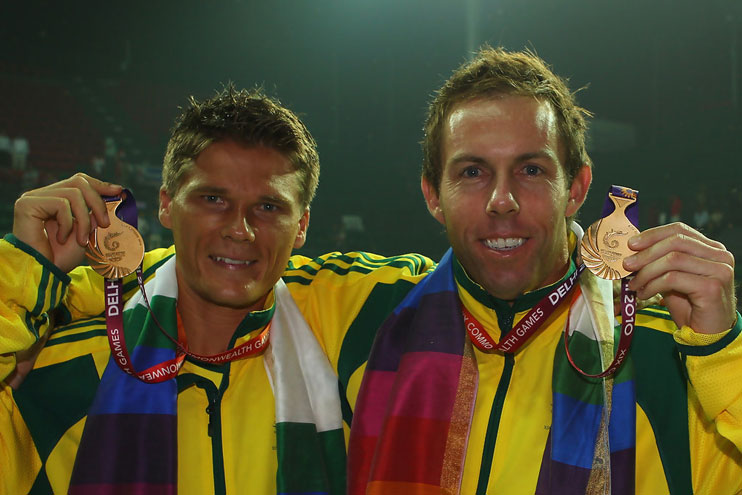
Men’s doubles team win the gold medal in tennis. (CGA Archives)
Australia dominates right across Delhi
In other highlights from the Games, the Australians swept the hockey pitch, with the Hockeyroos winning the women’s gold in dramatic fashion in a penalty shoot-out against the English side, while the Kookaburras cruised to a convincing 8-1 victory over the home nation, in front of a disappointed and at times rabid crowd.
Emily Bensted claimed Australia’s first female medal in wrestling at the Games, when she finished with the silver in the women’s 55kg freestyle category. Ivan Popov won the gold medal in the men’s Greco-roman 120kg category. Cameron Pilley paired with Kasey Brown to win the gold medal match in the Squash mixed doubles event, in fact upon Brown’s match-winning point, made history as Australia had secured our nation’s 2000th medal at the Commonwealth Games.
Our men’s rugby 7s side, featuring a young “Honey Badger” Nick Cummins, fell to the English side in the gold medal match to come away with the silver medal. Leif Selby would win the silver medal in the men’s lawn bowls singles event, before making a shock retirement from international bowls following the Games, when being at the top of his career.
Australian divers would finish the Games with 15 medals, including two gold medals, one being won by Alexandra Croak, who in the process became Australia’s first two-sport gold medallist after winning gold in gymnastics at the Manchester 2002 Games. While Simplice Ribouem (men’s 85kg) and Damon Kelly (men’s 105kg+) would claim Australia’s two weightlifting gold medals, with Vannara Be making history becoming the first Cambodian-born athlete to represent Australia at the Games.
On the shooting range, Australia finished with seven medals, including three gold medals, the trap pairs competitions with Michael Diamond pairing with Adam Vella to win the men’s, and Laetisha Scanlan and Stacy Roiall teaming to win the women’s.
The Games in India also saw the only time Tennis has been featured at the Games, and the Aussies dominated the competition winning eight of the 15 medals, with Anastasia Rodionova winning three medals, including two gold medals.
And the Games also saw the final time artistic swimming and archery were held at the Games. Eloise Amberger and Sarah Bombell paired to win bronze in the women’s duet artistic swimming event. While with the bow and quivers, our men’s recurve team won the gold medal, with Cassie McCall winning the only individual medal when she won bronze in the women’s individual compound.
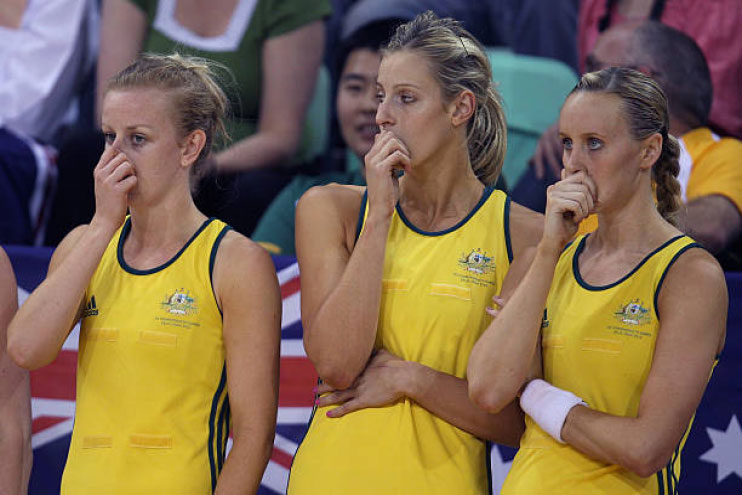
Australian Diamonds players devastated after double extra time loss to New Zealand. (CGA Archives)
Netball thriller closed out the Games
The biggest heartbreak of the Games was reserved for our Australian Diamonds netball team in the final gold medal to be decided at the Games.
Knowing they would be in for a fight when they faced archrival New Zealand in the gold medal match, the two teams battled back and forth, but could not be separated after four quarters as they headed to extra time. Needing to go up by two goals to now win, the two best netball nations in the Commonwealth again could not break away, needing to go into double extra time.
As players fatigued, running on adrenaline, the Silver Ferns players held their nerve and broke the hearts of the Diamonds and the nation as they became golden ferns, leaving Australia with the silver for the second consecutive Games.
The Games in Delhi came to a close on October 14th, and like Moneghetti had predicted leading in, they were to be like no other Commonwealth Games, an experience for the 366 athletes, with some bringing an end to their sporting journey, while some were just getting started.
The closing ceremony was a celebration of the 12 days of competition, and given her historic efforts in the pool, Alicia Coutts was rewarded with becoming the closing ceremony flagbearer for the Australian team.


